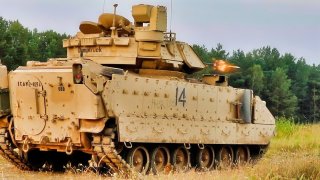Ukraine's Kursk Offensive: Victory, Triumph, or Misstep?
Any military operation that does not result in a decisive victory or defeat is subject to evaluation. Ukraine’s August 2024 Kursk Offensive is no exception.
Any military operation that does not result in a decisive victory or defeat is subject to evaluation. Ukraine’s August 2024 Kursk Offensive is no exception.
Ukraine deployed six combat brigades with support from two independent battalions, massing around 15,000 troops for the offensive. It has made Kursk a major battleground for the first time since the German push in 1943. To determine whether the Ukrainian offensive can be considered a victory, a triumph, or a tragedy, we must assess whether its objectives were achieved.
Ukrainian officials have offered various objectives for the offensive. Ukrainian President Volodymyr Zelensky has argued it aims to earn a bargaining chip to pressure Russia into accepting a deal that would see them withdraw from Ukrainian territory. Others believe that the offensive would exert enough pressure on Russia to force negotiations on Ukraine’s terms.
Ukraine’s commander in chief, Oleksandr Syrskyi, presented a different rationale. He claimed that Russia was preparing a massive offensive from Kursk into Ukrainian territory, potentially opening a new front, and that Ukraine needed to act pre-emptively to counter this threat.
Though there is currently no concrete evidence to suggest Russia was preparing to attack Ukraine from Kursk, we can evaluate the results of Ukraine’s campaign in terms of its political and military outcomes.
If the goal was to put pressure on Russia’s leadership or undermine the morale of Russia’s public and troops, Ukraine may have achieved some success. This marks the second time since 1941 that Russia’s mainland has been targeted by a foreign invasion, which could be seen as a blow to Russian President Vladimir Putin’s reputation.
However, it is harder to conclude this offensive will significantly erode Russian morale. Historically, Russians have demonstrated resilience when their homeland is under threat, often becoming more determined in their fight. It is too early to predict whether this will hold now.
In the meantime, if another political goal was to pressure Russia into negotiations or secure a ceasefire on Ukrainian terms, that goal has not been realized. Russian Security Council Secretary Sergei Shoigu stated that following Ukraine’s Kursk offensive, negotiations are off the table. For the moment, Russia appears unwilling to engage in diplomacy. This reluctance is understandable, as negotiating while Kursk is under Ukrainian occupation would likely be perceived as a sign of weakness by the Russian public, damaging the Kremlin’s political standing.
In terms of military objectives, if Ukraine aimed to force Russia to overextend its resources, or if the offensive was intended as a diversion to draw Russian attention away from critical battlegrounds in Luhansk and Donetsk, this goal has not been fully achieved. While some Russian troops have been redeployed to Kursk, reports indicate that most of these forces have not been withdrawn from key areas of the eastern front in Ukraine. Instead, they seem to have come from less critical regions, such as parts of Zaporizhzhia, Kherson, or even within Russia itself, rather than the main battlegrounds.
Additionally, Russia’s broader military focus does not appear to have shifted significantly. Russian forces continue their operations in Ukraine, with some even advancing on the key city of Pokrovsk. This suggests that Russia’s strategic priority remains on continuing its campaign within Ukraine, rather than being distracted by Ukraine’s Kursk offensive.
However, the fact that Russia has not yet diverted substantial forces or attention from Ukraine to Kursk does not mean it won’t in the future. Russia may still change its strategy, but for now, we cannot judge the operation as either a clear triumph or a tragedy based on immediate outcomes.
As the situation develops, we must wait to observe any significant strategic shifts. If Russia eventually enters negotiations over Kursk or reallocates substantial resources away from Ukraine to counter the Ukrainian offensive, then Ukraine may claim a strategic success. However, if the status quo persists, especially with Ukrainian troops tied down in Kursk as winter approaches, complicating logistics and supply chains, the operation may prove less beneficial for Ukraine than initially hoped.
About the Author
Arman Mahmoudian is a research fellow at the USF Global and National Security Institute. He is also an adjunct professor at the University of South Florida’s Judy Genshaft Honors College, teaching courses on Russia, the Middle East, and International Security Follow him on LinkedIn and X @MahmoudianArman.
Image Credit: Creative Commons and/or Shutterstock.


